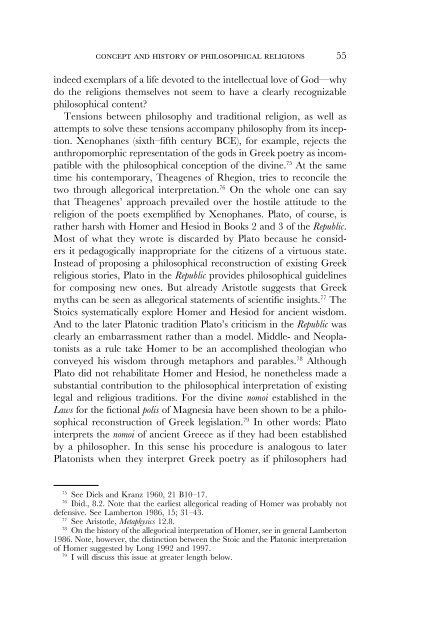Download PDF - Carlos F. Fraenkel
Download PDF - Carlos F. Fraenkel
Download PDF - Carlos F. Fraenkel
Create successful ePaper yourself
Turn your PDF publications into a flip-book with our unique Google optimized e-Paper software.
concept and history of philosophical religions 55indeed exemplars of a life devoted to the intellectual love of God—whydo the religions themselves not seem to have a clearly recognizablephilosophical content?Tensions between philosophy and traditional religion, as well asattempts to solve these tensions accompany philosophy from its inception.Xenophanes (sixth–fifth century BCE), for example, rejects theanthropomorphic representation of the gods in Greek poetry as incompatiblewith the philosophical conception of the divine. 75 At the sametime his contemporary, Theagenes of Rhegion, tries to reconcile thetwo through allegorical interpretation. 76 On the whole one can saythat Theagenes’ approach prevailed over the hostile attitude to thereligion of the poets exemplified by Xenophanes. Plato, of course, israther harsh with Homer and Hesiod in Books 2 and 3 of the Republic.Most of what they wrote is discarded by Plato because he considersit pedagogically inappropriate for the citizens of a virtuous state.Instead of proposing a philosophical reconstruction of existing Greekreligious stories, Plato in the Republic provides philosophical guidelinesfor composing new ones. But already Aristotle suggests that Greekmyths can be seen as allegorical statements of scientific insights. 77 TheStoics systematically explore Homer and Hesiod for ancient wisdom.And to the later Platonic tradition Plato’s criticism in the Republic wasclearly an embarrassment rather than a model. Middle- and Neoplatonistsas a rule take Homer to be an accomplished theologian whoconveyed his wisdom through metaphors and parables. 78 AlthoughPlato did not rehabilitate Homer and Hesiod, he nonetheless made asubstantial contribution to the philosophical interpretation of existinglegal and religious traditions. For the divine nomoi established in theLaws for the fictional polis of Magnesia have been shown to be a philosophicalreconstruction of Greek legislation. 79 In other words: Platointerprets the nomoi of ancient Greece as if they had been establishedby a philosopher. In this sense his procedure is analogous to laterPlatonists when they interpret Greek poetry as if philosophers had75See Diels and Kranz 1960, 21 B10–17.76Ibid., 8.2. Note that the earliest allegorical reading of Homer was probably notdefensive. See Lamberton 1986, 15; 31–43.77See Aristotle, Metaphysics 12.8.78On the history of the allegorical interpretation of Homer, see in general Lamberton1986. Note, however, the distinction between the Stoic and the Platonic interpretationof Homer suggested by Long 1992 and 1997.79I will discuss this issue at greater length below.



